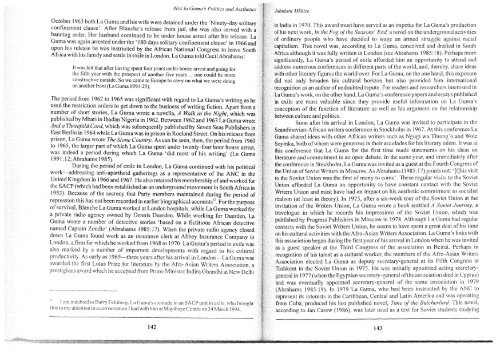Shane Moran - Alternation Journal
Shane Moran - Alternation Journal
Shane Moran - Alternation Journal
You also want an ePaper? Increase the reach of your titles
YUMPU automatically turns print PDFs into web optimized ePapers that Google loves.
Alex la Gums k Politics and Aesthet<br />
October 1963 both La Guma and his wife were detained under the 'Ninety-day solita<br />
confinement clause'. After Blanche's release from jail, she was also served with<br />
banning order. Her husband continued to be under house arrest after his release. L<br />
Guma was again arrested under the ' 180 days solitary confinement clause' in 1966 an<br />
upon his release he was instructed by the African National Congress to leave Sout<br />
Africa with his family and settle in exile in London. La Guma told Cecil Abrahams:<br />
It was felt that after having spent four years under house arrest and going for<br />
the iifth year with the prospect of another five years ... one cot~ld be more<br />
constructive outside. So we came to Europe to early on what we were doillg<br />
on another front (La Gunla 199 1 :25).<br />
The period from 1962 to 1965 was significant with regard to La Guma's writing as h<br />
used the restriction orders to get down to the business of writing fiction. Apart from<br />
r~umber of Short stories, La Guina wrote a novella, A Walk in the Night, whi<br />
published by Mbari in Ibadan Nigeria in 1962. Between 1962 and 1963 La Gum<br />
And a Threefold Cord, which was subsequently published by Seven Seas Publishers<br />
East Berlin in 1964 while La Guma was in prison in Roeland Street. On his relea<br />
prison, La Gulna wrote The Stone Country. As can be seen, then, the period fro<br />
to 1965, the larger part of which La Guma spent under twenty-four hour house<br />
was indeed a period during which La Guma 'did most of his writing' (La<br />
199 1 : 12; Abrahams 1985).<br />
During the period of exile in London, La Guma continued with his<br />
work-addressing anti-apartheid gatherings as a representative of the AN<br />
United Kingdom in 1966 and 1967. He also retained his membership of and w<br />
the SACP (which had been established as an underground movement in South Afric<br />
1953). Because of the secrecy that Party members maintained during the period<br />
repression this has not been recorded in earlier biographical accounts". Forth<br />
of survival, Blanche La Guma worked at London hospitals, while La Guma worked<br />
a private radio agency owned by Dennis Duerden. While working for Duerden, L<br />
Gurna wrote a number of detective stories 'based on a fictitious African detecti<br />
named Captain Zondie' (Abrahams 1985: 17). When the private radio agency close<br />
down La Gums found work as an insurance clerk at Abbey Insurance C<br />
London, a firm for which he worked from 1968 to 1970. La Guma's period in<br />
also marked by a number of important developments with regard to hi<br />
productivity. As early as 1969-three years after his arrival in London-La<br />
awarded the first Lotus Prize for literature by the Afro-Asian Miters Association,<br />
prestigio~~s award which he accepted from Prime Minister Indira Ghandhi atNew Del<br />
-<br />
I-<br />
i a171 ii~iichtrd to Ra~.i-y Feinberg. I,aGurna1s coin~ade<br />
this to 111~ altcr~tion<br />
in an SACP unit in exile, wl>o l~ro~~gl~t<br />
in aconversatioll I hatl with him at Mayibuye Centre OII 24 Marc12 1994.<br />
zilnni Mlihize<br />
dia in 1970. This award must have served as an impetus for La Guma's production<br />
s next work, In the Fog of fhe Seatsons' End, a novel on the undei-ground activities<br />
rdinary people who have decided to wage an anned struggle against racial<br />
ism. This novel was, according to La Gurna, conceived and drafted in South<br />
although it was fully written in London (see Abrahams 1985: 18). Perhaps more<br />
cantly, La Guma's period of exile afforded him an opportuni~ to attend and<br />
een culture andpolitics.<br />
Soon after his arrival in London, La Guina was invited to participate in the<br />
a shared ideas with other African writers such as Ngugi wa Thiong'o and Wole<br />
ka, both ofwhom were generous in their accolades for his literary talent. It was at<br />
rature and colnmitment in an open debate. In the same year, and iininediately after<br />
conference in Stockholm, La Gumawas invited as a guest at the Fourth Congress of<br />
Soviet Union was the first of many to come'. These regular visits to the Soviet<br />
afforded La Guma an opportunity to have constant contact with the Soviet<br />
ers Union and must have had an impact on his aesthetic coinmitinent to socialist
















